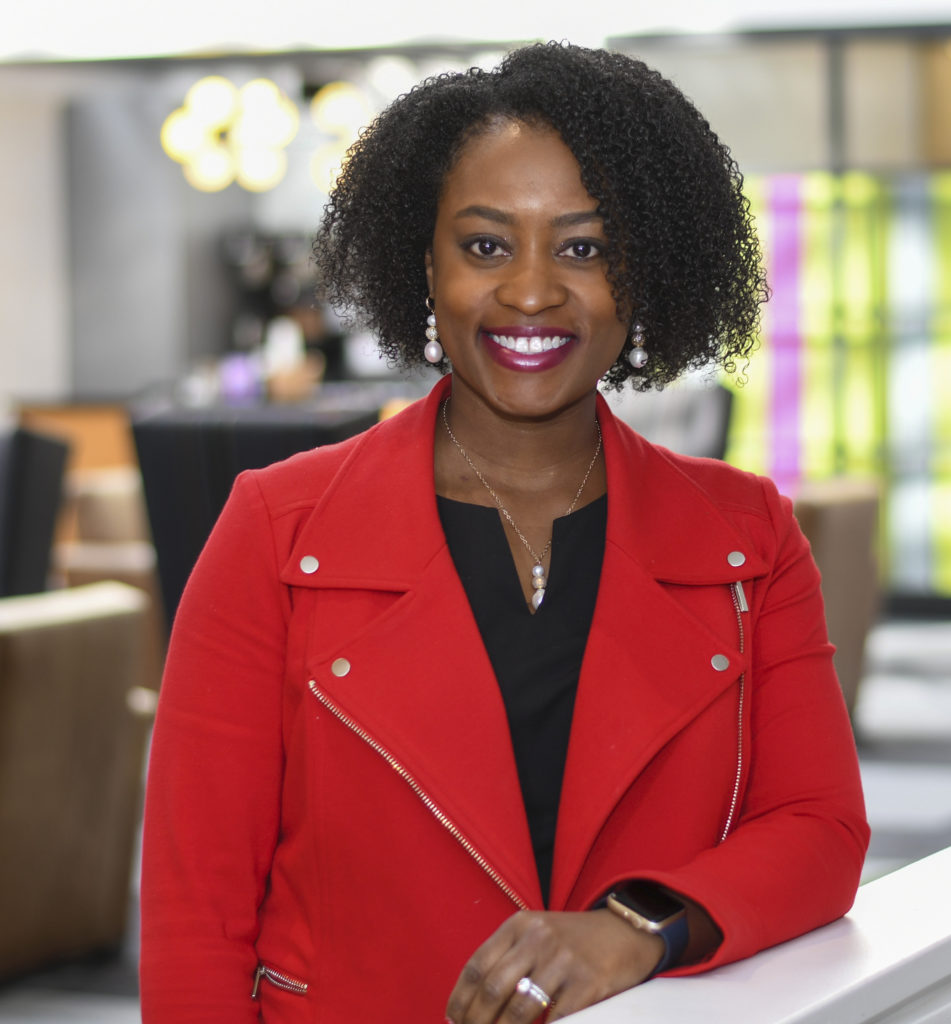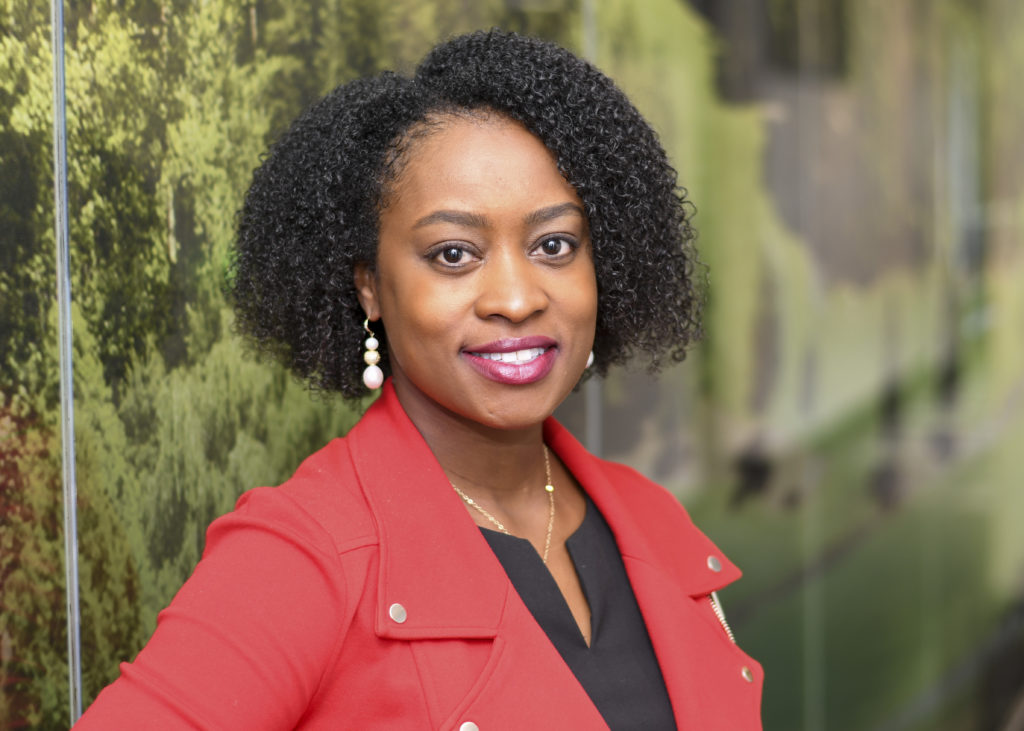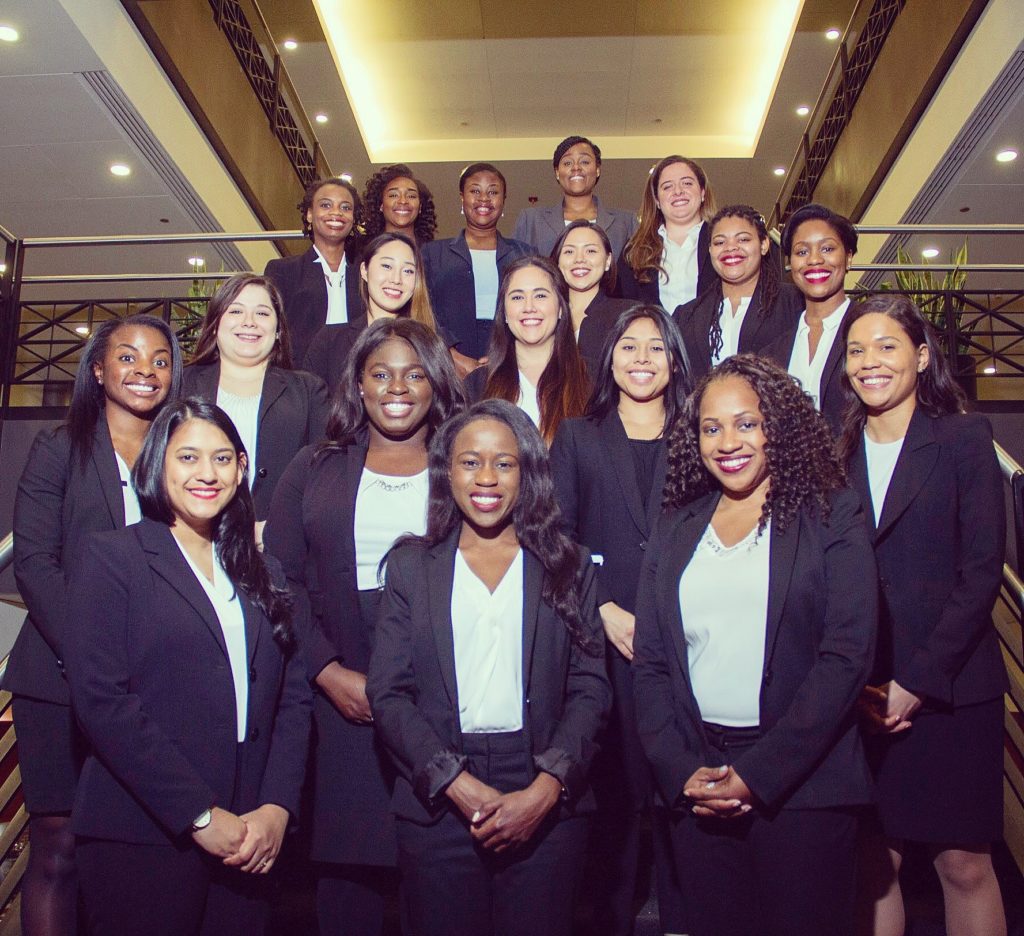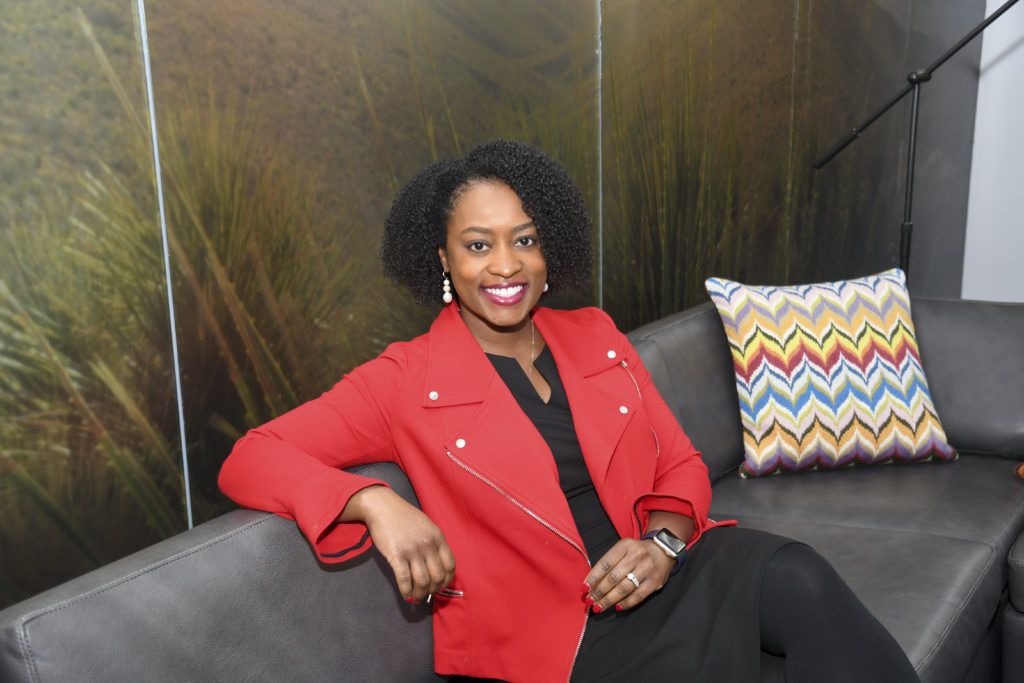
Even as a child, Chasity Henry noticed inequities and disparities in the world around her.
“Why are all the pastors of churches men? Why were most of my teachers white? Why were most of the people on TV shows and in movies and fashion magazines white? Why are most depictions of lawyers on TV white men?” she asked.
Henry was also the youngster who came to the defense of others.
“I just hated unfairness in any form,” she says. “When a kid was being picked on, I was usually the one speaking up for them. When I felt that a teacher was treating me or a classmate unfairly, I would speak up and try to explain my views and what I thought should be done.”
That core desire to right wrongs led Henry to becoming a lawyer.
“More than anything else, I saw lawyers as problem-solvers – people who were well-equipped to address unfairness,” she says. “I was eager to gain the tools to create the change and fairness I wanted to see in the world.”
Today, Henry is one of the most influential corporate in-house counsel in Texas. She has led several major corporate transactions during the past three years.
As an assistant general counsel at Kimberly-Clark Corporation, she played a key role in the December 2018 sale of its industrial welding and personal protective equipment businesses to Vancouver-based SureWerx. In September, she was the lead lawyer on Kimberly-Clark’s $25 million investment in Thinx, which makes reusable feminine care products. In 2017, she was legal counsel at Dr Pepper Snapple Group when she helped lead the company’s $1.7 billion cash acquisition of Bai Brands.
Lawyers who work with Henry say that she is a critical advisor to corporate executives. To the legal profession, she is a disruptor who is forcing much needed change.
To scores of young women lawyers of color in North Texas, Henry is a role model and hero who has made a substantive difference for diversity in the world of corporate law.
Henry was the first in her immediate family to graduate from college and the first to be a lawyer, though she admits, “Corporate law was the last thing on my mind, as I always thought I would be a trial lawyer.”
The Dallas/Fort Worth Chapter of the Association of Corporate Counsel and The Texas Lawbook are honored to present the 2019 Outstanding Corporate Counsel Award for Diversity to Chasity Henry.
Henry and the other in-house corporate counsel award finalists and winners will be honored at a major event Thursday, Jan. 30, at the George W. Bush Institute and Center.
A passion that leads to positive change
“Chasity’s boundless energy and commitment to others has made a real impact on the lives of many women of color,” says Sidley Austin partner Sara Garcia Duran. “She created a support network for her peers that has resulted in greater exposure and success for women of color, and also leveraged her network to help law students and young people navigate their lives and careers.”
Henry possesses a “unique breadth and depth of experience” shared by very few corporate counsel, according to Amy M. Stewart of the Stewart Law Group.
“Beyond her technical expertise, what makes Chasity an outstanding corporate lawyer are the relationships she has built with her clients at every stage of her career,” says Stewart. “This is closely related to her desire to learn the business and help solve problems.
“The best way to learn the business is to form great relationships — built on mutual trust and respect — with business stakeholders at every level and across various business units in a company,” Stewart says. “Chasity has worked very hard on this aspect of her career and excels because of it.”
Clark Hill Strasburger member Sarah Wariner says Henry has an unlimited “drive” to do good.
“Chasity has never met a challenge she can’t conquer,” Wariner says. “If there is a problem to be solved, Chasity will find the right resources and solutions, regardless of what stands in her way.”

“Despite being a corporate attorney, mother and wife, among other things, Chasity volunteers her time to bettering the legal community,” she says. “Her commitment to NEW Roundtable is just one example.”
To say that Henry has been a leading voice for diversity and inclusion in the legal profession in North Texas would severely understate the impact that she has had.
In 2015, she founded The NEW Roundtable, a nonprofit organization comprised of in-house and outside counsel. The mission of the NEW Roundtable (NEW stands for Network of Empowered Women) is to enhance and promote the advancement of African-American women attorneys within the legal profession. The organization has witnessed extraordinary success.
But Henry didn’t stop there. In the summer of 2018, she helped launch DAPP Direct. DAPP stands for Diverse Attorney Pipeline Program, which can be credited with significant achievements during the past two years.
“Diversity numbers have declined during the past decade because we continue to do the same things that haven’t worked and we keep doubling down on those same tactics,” she says. “New ideas need to be tried. Law firms need to expand the number of law schools from which they recruit, and they need to recruit a little deeper into the class, instead of just stopping at the top 10%.”
“I prefer the carrot approach to dealing with law firms and increasing diversity, but sometimes we need to use the stick that we have, too,” Henry says. “More legal departments need to hold their outside law firms accountable.”
Amy Stewart of the Stewart Law Group says Henry is “incredibly courageous” to be so vocal about diversity.
“There are a lot of people who talk about diversity, but Chasity is doing more than lip service,” Stewart says. “She puts her business reputation on the line to speak out. At every level, Chasity is trying to make change.”
“Chasity is making a big difference in the legal profession.”
The influence of family and education
Henry was born and raised in Fort Worth. Her mother was a federal employee for several years and was able to stay home with her three children when they were growing up.
Henry’s father worked on an assembly line for several years, earning just enough money for the family to survive. But her dad decided to change careers and become an air traffic controller – a decision that had a lasting impact on the lives of their family.
“In order to get the job, he was required to attend and graduate from a three-month academy in Tulsa, Oklahoma,” Henry says. “The failure rate was in the 60th percentile. Despite the challenges and risks, my dad quit his job and moved to Oklahoma to attend the academy.”
Henry says her father came home on weekends, but he studied “almost around the clock.” His hard work paid off.

“He graduated from the academy at the top of his class and was hired as an air traffic controller, greatly increasing our family’s opportunities,” she says. “Seeing him work hard to accomplish such a challenging goal and my mother’s partnership with him in that endeavor taught me valuable lessons that have stayed with me. When opportunities present themselves, take advantage and then put in the work to accomplish your goals.”
When Henry was 10, her father showed her a “map of the sky where airplanes could fly.”
“On my first trip to Europe to study abroad in London, my dad called the pilot, who then announced over the speaker system that my dad had found them a shortcut for the flight,” she says.
Henry’s parents emphasized the importance of education to their three children. Her sister is a surgeon and a brother is an NYU-educated actor.
A young Chasity decided early in high school that she wanted to be either a doctor or lawyer. Her parents convinced her to attend a magnet school focusing on the medical profession, which required her parents to drive her a considerable distance to take her to classes daily.
“Though I clearly did not become a doctor, having the experience of attending an academically rigorous high school, and doing well allowed me to gain confidence in my ability to be successful in challenging environments,” she says. “Attending a high school for the medical professions, rotating through hospitals and interacting with many doctors, allowed me to rule out wanting to become a doctor and narrowed my focus to practicing law.”
For her undergraduate studies, Henry attended Wheaton College, a highly respected liberal arts university founded in 1860 by Christian abolitionists. The college was a prominent stop on the Underground Railroad and is one of the top 20 universities in the U.S. in producing alumni with Ph.D.s.
Henry describes her time at Wheaton as a “life-changing” experience.
“College was the first time I spent any extended amount of time in the minority,” she says. “I grew up in a primarily African-American neighborhood and attended an African-American church and schools. I was in a fairly homogenous environment where differences were not based on ethnicity but rather just individual and family differences, income, education and access to opportunities.
“While I knew about bias and discrimination in the broader society, I did not have practical, everyday experience, given my upbringing,” she says. “I was in somewhat of an African-American working/middle-class bubble. My parents had provided us with a comfortable life full of laughter and love, surrounded by family in friends.”
At Wheaton, Henry was one of very few minority students.
“So college was where I began to feel the impact of being an ‘other,’ of having a different background, different traditions, attending a different type of church,” she says. “That is also where I became very interested in racial equity, coming to realize why so many African Americans and other people of color lacked access to opportunities like the one I was taking advantage of by attending college.
“It was eye-opening. I also began to realize the value of diversity and how having different perspectives in a room and around a table made a huge difference in whether and how we came to understand and appreciate differences,” she says. “The seeds for my commitment to diversity and inclusion were definitely sewn during those college years.”
For law school, Henry returned to her home state and attended the University of Texas School of Law, where she received her doctor of jurisprudence in 2006.
A career altering experience
Henry says that another “career-altering experience” came during law school when “someone who did not know me at all took a chance on me and gave me an opportunity.”
That someone was then-Vinson & Elkins associate Lisa Bowlin, an appellate lawyer in Dallas and UT alum.
“I reached out … and just said, ‘Hey, I’m a first-year at UT. I see you work at V&E. That’s one of the firms that I’d be interested in. I would love to meet up with you for lunch or coffee sometime to pick your brain,’” Henry says. “Long story short, we had lunch, she provided some great guidance for my job search, and she passed my resume on to the V&E hiring partner in Dallas – Tom Leatherbury.”
Henry clerked two years at V&E and then accepted the firm’s offer to join as an associate.

“Lisa did not know me at all, but she saw something in me she thought was worth investing in,” she says. “I’ve been fortunate to have many people invest in me, the way Lisa did, throughout my career. That is a big part of the reason I choose to invest in others – especially law students.”
During her four years at V&E, Henry mentored under prominent dealmaker Jeff Chapman, who is now a partner at Gibson, Dunn & Crutcher in Dallas.
“It is remarkable how well Chasity does in every aspect of her life,” says Chapman, who worked with Henry on multiple transactions.
“Chasity sweats the details but understands what’s really important and – just as important – what’s not,” Chapman says. “In other words, she has tremendous judgment. She comprehends the duality of her role as a lawyer and as a businesswoman remarkably well. And she has unparalleled poise. She never loses her cool and is calm in a crisis.”
Henry says she loved the legal work that allowed her to “take a deep-dive into issues that were important to the business.”
“The more I talked to business people and got to know the drivers of a particular client’s business, the more meaningful my work became,” she says. “A couple of years into my practice, I knew that I wanted to go in-house, preferably in an environment where I would have a high volume of interaction with the business.”
In October 2010, Irving-based healthcare services company Vizient (formerly Novation) hired Henry to handle procurement and supply chain transactions and later handle compliance and support human resources.
In 2015, Dr Pepper Snapple General Counsel Jim Baldwin hired Henry to be the company’s corporate counsel handling real estate transactions, M&A and procurement and supply chain transactions.

In October 2017, multinational consumer products conglomerate Kimberly-Clark, which reported more than $18 billion in 2019 revenues, hired Henry to be its assistant general counsel of corporate affairs and legal strategy. Henry leads the legal department’s team that supports strategic acquisitions and joint ventures for Irving-based company.
“I am very happy to work for a company where leadership recognizes that in order to grow and prosper, we must build a more inclusive global organization that applies its diverse experiences and passions to brands that make life better for people all around the world,” she says. “The company’s commitment extends to programs that include employee resource groups and an expansive nondiscrimination policy that covers gender identity and genetic information in addition to more traditional diversity areas.”
Henry says the Kimberly-Clark General Counsel Jeff Melucci is “deeply committed to diversity and inclusion and encourages our team to actively create and nourish an inclusive environment where each person can leverage their unique backgrounds and talents to deliver results for the company.
“Under Jeff’s leadership, diversity and inclusion are embedded within our recruitment and retention strategies as well as our selection of key law firm partners as outside counsel,” she says.
Exploring best practices for fostering diversity
In October 2014, Henry’s involvement in the diversity issue heightened when she invited a group of African-American women – most of them graduates of UT Law – to a program at V&E to discuss their experiences with diversity and inclusion.
“I’m keenly aware of the data, and the numbers definitely do not tell a great story, to put it mildly,” she says. “For instance, not only are the percentages of women of color associates and partners low, but according to [National Association of Law Placement] data, for the past decade, the numbers of women of color have only slightly improved and, in the case of African-American women, the numbers have consistently declined.”
“The C-suite executives are still mostly male,” she says. “After a series of lunches and happy hours, we decided we needed to get serious and start our own effort to help each other through mentoring, recommending each other for jobs and giving business to each other. We realized that we are in a position to address the pipeline, because the present lack of diversity in the legal profession will continue if we don’t.”
The NEW Roundtable was formed. The result has been that members have gotten hired on major legal projects. Some have been promoted to partner. Others have been appointed to seats on boards.
“There were 25 of us there at the start,” she says. “We have built a supportive, thriving network of over 100 African-American women in Dallas, practicing in-house, at law firms, in government, in academia, in the judiciary and as solo practitioners. Over the past five years, with the help and support of many in the DFW legal community, we have helped one another to succeed personally and professionally.”
Henry says that 30 women of color have asked to join The NEW Roundtable in 2020.
A major issue facing improved diversity, she says, is the pipeline. NEW Roundtable members started discussing concrete ways in which they could help replenish the pipeline of diverse talent at corporate law firms in Dallas. Everything was on the table, including starting a mentoring program for law students with an emphasis on matching talented women of color with local law firms.
“I will admit that the prospect of starting such a program from scratch was daunting, to say the least,” she says.
But Henry and others learned about a Chicago effort called DAPP Direct, which is a multistep national job fair run by women of color for women of color who are first-year law students.
As part of the program, women of color in-house counsel interview the students at the job fair and then place the students in paid internships following their first year of law school.
This provides law firms with “talented, client-ready women of color“ who have received professional development and mentoring from successful women of color who are in-house counsel.
The results after two years of DAPP Direct in Dallas, according to Henry, have been excellent.
In 2018 stats, DAPP Direct in Dallas made 17 placements from 15 different law schools. Of those, 70% received offers for paid internships after the job fair and six returned to their 1L law firms as 2L summer associates.
In 2019, the numbers were even better. DAPP Direct resulted in 34 placements from 14 law schools. Of those, 91% received offers for paid internships after thef job fair and 75% of the placed students received law firm offers following their 1L summer.
For 2020, 14 law firms and 14 corporate legal departments have already signed up to participate. More than 150 women of color law students have applied to participate in the job fair.
Henry says the DAPP board will conduct initial video conference interviews with the students to determine which to invite to the job fair.
“This is one of my favorite parts of the program,” she says. “Many of the students have faced and overcome adversity and yet are confident and poised and have an unlimited amount of potential.
“I remember being in their shoes and enjoy the opportunity to hear their stories, share mine and provide any guidance I can,” Henry says. “I am happy to keep in touch with some of the students with whom I conducted those video interviews. It is truly a joy to watch as their confidence, skills and opportunities have grown as a result of this program. That, to me, is by far the most important aspect of DAPP Direct.”
K&L Gates partner Jill Louis says Henry has experienced success in addressing diversity because she always engages in an impactful way.
“Chasity was not content to just talk about the diverse pipeline,” Louis says. “She is executing on solutions. For this reason, her time in the profession will mark the end of the excuses for the lack of diversity. Chasity understands teamwork and how to coalesce teams. This is the real trick of leadership that is difficult to master but comes to Chasity innately.”
